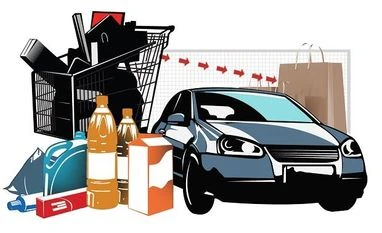Consumer goods companies are likely to post stronger fourth-quarter sales growth in Europe than in the United States, monthly data indicates, boosted by persistently higher prices in countries like Britain, France and Germany even as Americans paid less.
Companies like Procter & Gamble and Nestle began hiking prices in the United States at the end of 2021, driven initially by a pandemic-led freight and input cost crisis.
The hikes, which ramped up following Russia's invasion of Ukraine, were easier to take in the United States than Europe because contracts with companies like Walmart and Target are a lot more flexible than highly regulated deals in Europe.
As the increases came early in the United States, the worst of it is over, analysts said, while European prices will take longer to ease.
"Sales growth in Europe is higher ... but that is just a matter of time. In six months' time, pricing in Europe will normalise, just like in the United States, and they will have similarly low growth," Bernstein analyst Bruno Monteyne said.
P&G, the world's biggest personal goods company, will kick off reporting the sector's fourth-quarter earnings on Tuesday.
More From This Section
Price hikes likely drove strong store sales growth in Europe at companies including Nestle, Danone, Kraft Heinz and Reckitt, according to monthly estimates by information and market measurement group Nielsen, even as growth in the United States was weaker.
For instance, in the four weeks ended Dec. 2, Reckitt's U.S.
store sales were down 4.2%, according to Nielsen, but up 8.1% in the four weeks ended Dec. 3 in Europe. The data showed Nestle's U.S. store sales fell 2.5% in that period, while its European sales rose 5.2%. Nielsen data does not cover every possible sales channel.
Pepsico, which is in acrimonious pricing negotiations with French supermarket operator Carrefour , is estimated to have generated only 1.1% store sales growth in the United States in the four weeks to Dec. 2.
Meanwhile, P&G is estimated to have had 3.4% U.S. store sales growth in that period versus 6.1% in Europe in the four weeks to Dec. 3.
COMPETITIVE PRICING
The easing of prices came as U.S. consumer confidence increased during the quarter after months of decline, with Americans growing more optimistic about current and future business conditions as well as the labour market. The consumer confidence index jumped to a five-month high in December.
In Europe, however, economic sentiment rose only slightly during the final quarter of the year, in line with expectations, as a modest up-tick of the mood in services, retail and amongst consumers outweighed a decline in manufacturers' confidence.
Analysts and investors have for months warned that continuing to raise prices in Europe could alienate cash-strapped shoppers who have been turning to retailers' own brands, which are widely available.
"Some companies will have lost market share and may want to price more competitively to win some share back," said Tineke Frikkee, a portfolio manager at Waverton Investment Management, which invests in Unilever and Reckitt. "Pricing decisions will vary per product, per country, per company." Nestle, Danone and Kraft Heinz and Reckitt declined to comment. Pepsico and P&G did not respond to requests for comment.
)